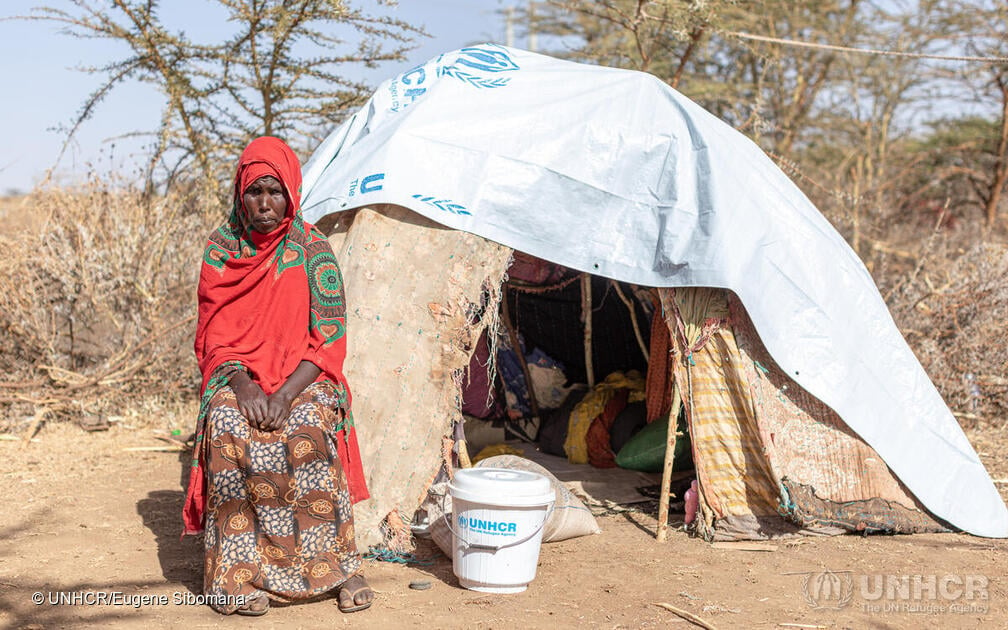Finland’s unearmarked funding allows UNHCR to respond to the worsening humanitarian crisis in Ethiopia.
The horn of Africa is experiencing the worst drought in 40 years. Water sources have dried up, and crops and livestock have died, stripping people of their livelihoods and the ability to support themselves.
As a result, an estimated 18.4 million people in the Horn of Africa, forcibly displaced people and host communities alike, now face severe hunger, unprecedented food insecurity and water shortages. 7.1 million children in Ethiopia, Kenya, and Somalia are acutely malnourished.
Ethiopia hosts more than 875,000 refugees, primarily from South Sudan, Somalia, and Eritrea. At the same time, more than 4.51 million people are internally displaced in Ethiopia, primarily due to the conflict in the northern part of the country.
With water sources drying up, impacting livelihoods and amplifying conflicts, more people are fleeing, both internally and across borders. The unearmarked support from Finland helps UNHCR works to mitigate the impact of climate shocks and respond to the worsening humanitarian crisis in Ethiopia and on the Horn of Africa.

During the first quarter of 2022, UNHCR has, together with partners and local authorities, reached 2.1 million people with basic and life-saving assistance, such as water, food, blankets, kitchen sets and sanitation items.

After the spread of violence in the northern parts of Ethiopia, UNHCR has set up new camp sites to accommodate internally displaced people. As of June 2022, UNHCR has provided shelter and relief items to more than 134,000 internally displaced people in northern parts of Ethiopia.

With help from government partners and local communities, more than 3,600 refugees have gained access to around 1,600 hectares of land for crop production in Ethiopia’s western, north-western, and eastern regions.

In 2022, UNHCR and its partners have assisted local authorities in providing water services to over 50,000 internally displaced people and hosting communities in and around the refugee camps in the Somali region.

At the beginning of 2022, UNHCR responded to a measles outbreak affecting new arrivals and communities bordering Somalia. UNHCR and its partners vaccinated more than 52,000 refugees for measles and are continuing with outbreak surveillance.

Thousands of refugees across the country have been enabled to improve their food security through livelihood training, access to land and linkage to financial services by UNHCR.

A total of 162,400 refugees have been enrolled in pre-primary, primary and secondary education. Of these, more than 102,000 primary school children were provided school meals to support learning and attendance. UNHCR also provides emergency education for children in new refugee sites.

In collaboration with UNICEF, WFP, RRS and nutrition partners, UNHCR provided ready to use supplementary feeding products for the treatment of acutely malnourished children to refugees in 41 nutrition centers across 23 refugee camps in Ethiopia.

Due to extreme weather conditions in north-eastern Ethiopia, UNHCR, in collaboration with partners, facilitated the process of building 500 weather-friendly shelters to accommodate refugees. UNHCR also relocated 665 internally displaced people, providing them with transportation and protection.

UNHCR and partners are supporting households and small businesses in the Somali region with solar power energy, providing both refugees and local communities with clean and affordably energy. In addition, the installation of solar streetlights ensure that people can move around safely in the evenings.
Finland as a donor
Finland is a staunch supporter of UNHCR and a top donor of unearmarked funding, allowing UNHCR to respond to and prepare for emergencies. Thus far, in 2022, Finland has provided UNHCR with over USD 23 million, of which USD 8.2 million was unearmarked, allowing UNHCR to respond quickly to the worsening humanitarian crisis in Ethiopia. In 2021, Finland provided UNHCR with approximately USD 26.6 million, of which 31% was unearmarked, and more than USD 2.3 million targeted the Ethiopian operation.
Share on Facebook Share on Twitter